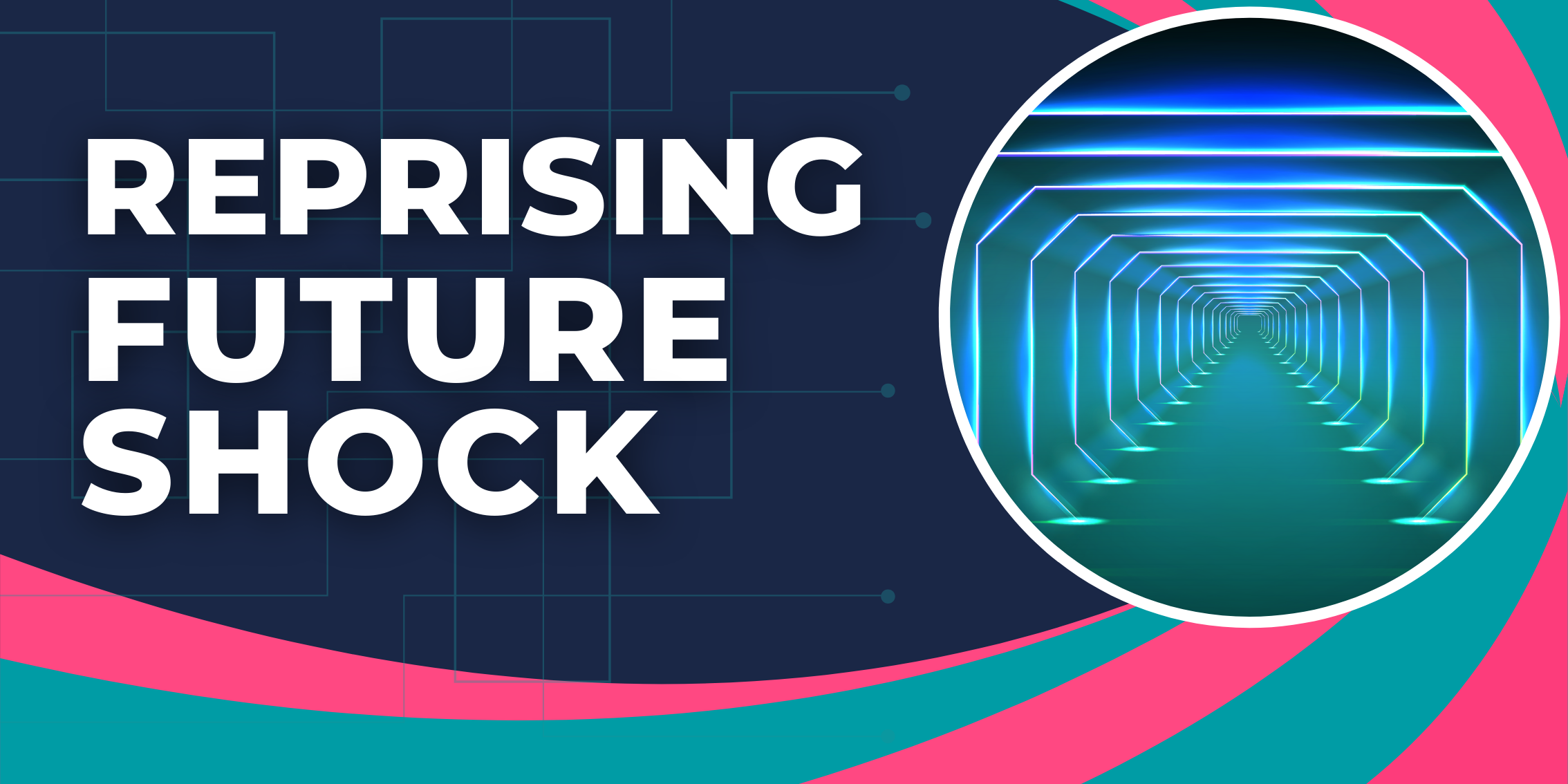
Reprising Future Shock
By Josh Marshall
Welcome to the workplace of today and the future where being flexible, adaptive and skilled at communicating effectively, in multiple mediums, is a non- negotiable prerequisite.
The workplace has always been a bit of a chameleon, changing its colours in response to a myriad of technological, societal, and economic shifts that never seem to end. But the current era, marked by rapid tech advances, and globalisation on steroids, is not new.
All this type of rapid change could easily be part of "Future Shock," a term coined by the ever-prescient Alvin Toffler in 1970. It perfectly describes that odd feeling of being completely disoriented by the relentless, rapid-fire changes we are all experiencing. So, as we balance on the edge of a future that looks a little like chaos, it's crucial to take stock of the challenges and the opportunities that the pandemonium presents.
Robot Whispering
As you know, one of the most significant drivers of future shock is the rapid acceleration of technological innovation. Advances in artificial intelligence (AI), automation, and robotics are revolutionising industries and fundamentally altering the nature of work.
According to a McKinsey Global Institute report, up to 30% of the global workforce could find themselves displaced by automation before 2030. Yes, robots might be taking over, and no, they won't be bringing you coffee.
Roles involving repetitive tasks or low-skill labour are particularly vulnerable, leaving millions of workers facing obsolescence unless they can adapt. Think of it as a massive game of musical chairs, where the music is a techno beat, and the chairs are disappearing faster than you can say "AI revolution". While these technologies promise increased efficiency and productivity, they demand a workforce equipped with new skills.
For instance, the World Economic Forum’s Future of Jobs Report 2023 highlights the growing importance of analytical thinking, technology skills, and emotional intelligence. So, beyond being a people person, you may also need new, robot whispering Skills.
Unfortunately, the processes of upskilling and reskilling are both time-consuming and resource-intensive, often leading to resistance or anxiety among workers.
The Gig Economy and Remote Work
Parallel to technological advancements, the rise of the gig economy and remote working is reshaping employment models. Traditional full-time roles are increasingly being replaced by freelance and contract-based work. While this shift offers unparalleled flexibility, it also exacerbates financial instability and job insecurity. A survey by Gallup revealed that 70% of gig workers globally lack access to any form of employer-sponsored benefits, further amplifying their Stress.
Remote workers, who grew rapidly in numbers through the COVID years, have emerged as another trend that is reshaping workplaces and impacting the levels of worker engagement. Research by Global Workplace Analytics shows that remote work grew by 173% between 2005 and 2020, and this trend is expected to continue. While remote work improves work-life balance and reduces commuting time, it comes with communication challenges, diminished social interaction, and massive impacts on workplace cultures.
Economic and Political Volatility
Economic and political factors add another layer of complexity. Global interconnectedness has made businesses reliant on intricate supply chains, which are about as fragile as fine China. One little hiccup, like a pandemic, and it's a mess.
Moreover, geopolitical tensions, trade disputes, and ever-changing regulations are creating a perfect storm of economic uncertainty, inflation and a huge number of worried well in every workplace.
The Mind Health Challenge
The convergence of all these disruptors creates a sense of chaos and disengagement that can have profound psychological consequences. Workplace stress and disengagement are at record levels.
Gallup’s 2023 State of the Global Workplace report reveals that only 23% of employees worldwide feel engaged at work, while 44% experience significant stress.
This disengagement is not just a productivity issue; it’s a mental health crisis. As workers confront uncertainty, they often experience feelings of disorientation, anxiety, and a loss of control. Yet, amidst this chaos lies an opportunity to foster resilience, innovation, and adaptability.
Navigating the Future
Every organisation is faced with successfully navigating several challenges to help their workers and businesses thrive into the future. Here are five obvious challenges to name just a few.
1. Upskill and Reskill: Organisations will need to invest in training programs tailored to emerging industry demands. For example, Amazon’s Upskilling 2025 initiative aims to retrain 100,000 employees in areas such as machine learning and cloud computing.
2. Build Adaptability: Specific training will be needed to help workers build skills that can meet the multitude of chaotic challenges, turning perceived threats into opportunities.
3. Support Well-being: A priority should be placed on mental health and well-being, with flexible work arrangements, fun work environments and people-oriented leadership being just some of the crucial elements.
4. Leverage Technology: While technology disrupts, it also offers excellent solutions to growing work demands and productivity challenges.
5. Grow Organisational Resilience: Resilient organisations are those that anticipate and prepare for disruption. This involves diversifying supply chains, adopting agile project management methodologies, and fostering a culture of innovation.
Future Leaders
New leadership styles are pivotal to guiding organisations through the roller coaster of the future. Think of leaders as ringmasters in a modern workplace circus, juggling a multitude of performance responsibilities, while simultaneously meeting the emotional needs of their team members and communicating in a clear and transparent fashion. They need to be like the safety net in this high-wire act, helping to alleviate employee anxiety, foster a sense of stability, while driving for productive business outcomes.
Future leaders will need to adopt a human-centered approach, recognising that employees are not just cogs in the corporate machine, but unique individuals with their own quirks and aspirations. They will need to create inclusive and supportive workplace cultures that can reengage and harness the full potential of their teams. More like a superhero than a ringmaster.
Embracing the Future
The future workplace will undoubtedly be a wild ride, full of twists and turns. But hey, who doesn't love a good thrill ride? By embracing change, sharpening adaptability skills, and keeping well-being in check, organisation can turn the chaos of future shock into a launchpad for healthy success.
As Alvin Toffler, the Nostradamus of work-life disruption, once said, "The illiterate of the 21st century will not be those who cannot read and write, but those who cannot learn, unlearn, and relearn." Translation: It's all about having a flexible mind and being ready to pivot at the speed of sound.
References
- Toffler, A. (1970). Future Shock. Bantam Books.
- World Economic Forum. (2023). Future of Jobs Report 2023.
- Gallup. (2023). State of the Global Workplace Report.
- McKinsey Global Institute. (2017). Jobs Lost, Jobs Gained: Workforce Transitions in a Time of Automation.
- Global Workplace Analytics. (2020). Remote Work Statistics.
- Amazon. (2023). Upskilling 2025 Initiative. Amazon website.
About the Author: Josh Marshall
 Josh is the General Manager of Crucial Dimensions, and Co-founder of Chaos Cultures. An experienced people leader with a track record of transforming workplace cultures across various industries, Josh is dedicated to building safer environments that enhance organisational effectiveness and drive high performance.
Josh is the General Manager of Crucial Dimensions, and Co-founder of Chaos Cultures. An experienced people leader with a track record of transforming workplace cultures across various industries, Josh is dedicated to building safer environments that enhance organisational effectiveness and drive high performance.

